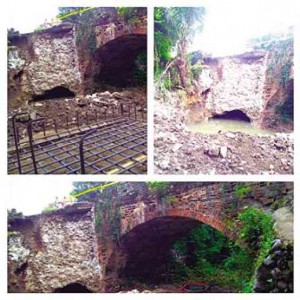MANILA, Philippines–The Department of Public Works and Highways (DPWH) has suspended repair work on the 196-year-old Dampol Arch Bridge that was built by Spanish missionaries and the Isinay tribal group in the municipality of Dupax del Sur, following the protests staged by Nueva Vizcaya residents.
The DPWH will “consult and coordinate with the proper authorities before resuming the bridge repair project,” said district engineer Ronald Reyes in a phone interview on Thursday.
He was referring to the National Historical Commission and the National Commission on Culture and the Arts (NCCA).
Reyes clarified that contrary to some reports, the department had “no intention of demolishing the bridge.”
“Destroying the ancient structure is not part of our plan,” he stressed.
Small cracks found
Reyes explained that DPWH field personnel found small cracks in some sections of the bridge sometime in June.
“That prompted us to conduct repairs and retrofit the old brick structure. An initial P2 million was set aside for the project,” he said.
According to Reyes, the DPWH also plans to “extend the width of the bridge by two meters on each side and provide space for the walkways.”
The single-arched Dampol bridge, which is 10.8 meters long, has a width of only four meters. It spans the Abanatan Creek which divides the towns of Dupax del Norte and Dupax del Sur in Nueva Vizcaya.
It was locals working out of an old adobe workshop near the Dominican church of San Vicente Ferrer in Dupax who built the red-colored brick structure when Fr. Francisco Rocamora was still vicar, according to the Dupax town records.
To this day, the DPWH has not yet determined the load limit of the bridge, which was constructed sometime in 1818.
That is why “bridge users are limited to light vehicles,” Reyes said.
Last week, historian Regalado Trota Jose, a former NCCA commissioner, and Nueva Vizcaya resident Analyn Salvadort-Amores led a petition-campaign to stop the alleged DPWH plan to demolish the bridge.
Jose reportedly claimed the agency had removed sections of the structure’s brick covering, and warned that this could expose the ancient bridge to further damage.
Bridge threatened
Amores said Dampol bridge was “being threatened by a road construction and widening (project) of DPWH-Nueva Vizcaya’s Second Engineering District.”
“This is an important historical and cultural landmark in Dupax. We hope to protect it from demolition to preserve and have it declared a National Cultural Heritage,” she added.
Public Works Secretary Rogelio Singson earlier reminded DPWH personnel to “respect and preserve historic sites” in the implementation of road and other infrastructure projects nationwide.
In a statement, he asserted “we have to preserve these historic sites and structures for the young generation to learn from out past.”
Preservation of sites
He noted the preservation of these sites should be taken into consideration during the conduct of project feasibility studies “in order to avoid unnecessary delays, revisions and alterations during the construction stage of the projects.”
Singson cited Department Order No. 243, issued on Nov. 26, 1991, by the then DPWH Secretary Jose de Jesus, instructing all agency field personnel to “coordinate closely with the National Historical Institute (now National Historical Commission of the Philippines), National Museum and the NCCA in the identification and preservation of historic sites, monuments and other structures of historical value” prior to the implementation of state infrastructure projects.
